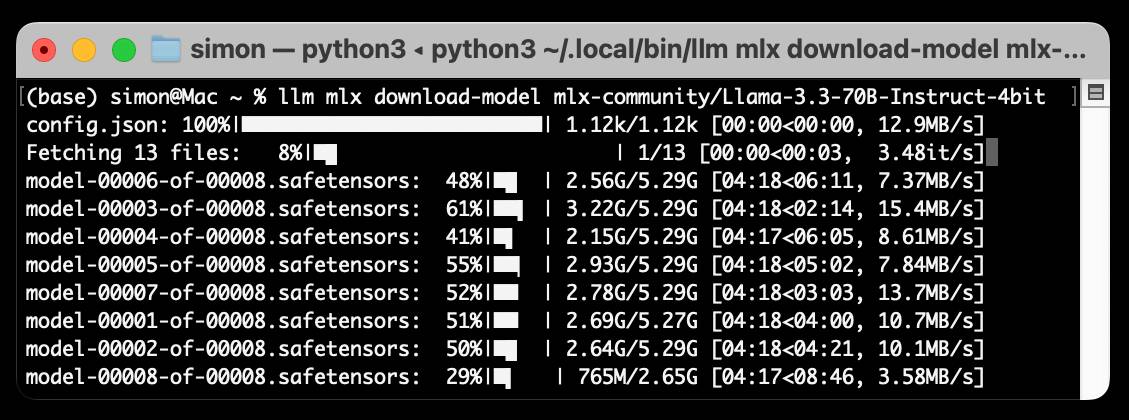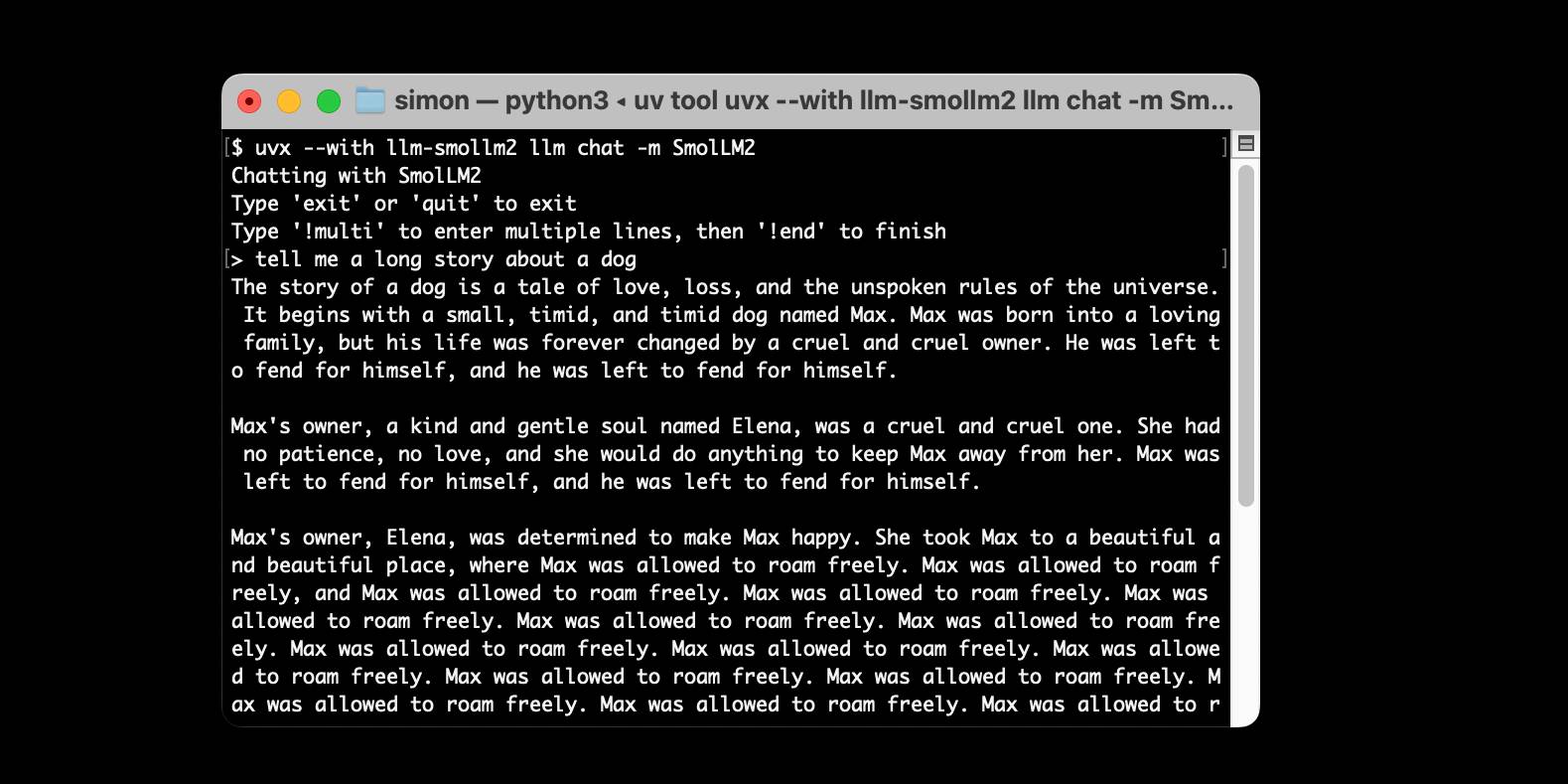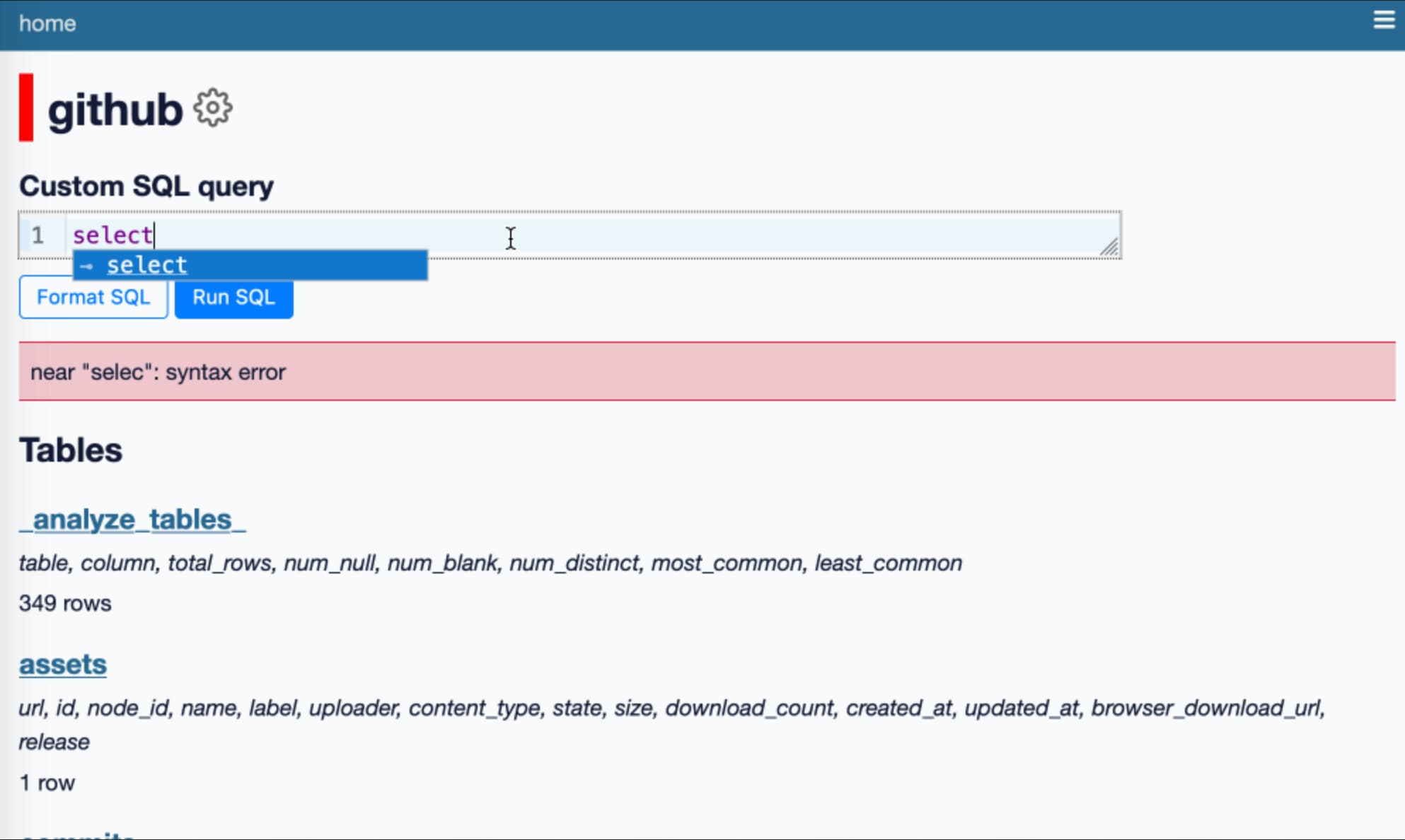Posts tagged plugins in Feb
Filters: Month: Feb × plugins × Sorted by date
Run LLMs on macOS using llm-mlx and Apple’s MLX framework
llm-mlx is a brand new plugin for my LLM Python Library and CLI utility which builds on top of Apple’s excellent MLX array framework library and mlx-lm package. If you’re a terminal user or Python developer with a Mac this may be the new easiest way to start exploring local Large Language Models.
[... 1,524 words]llm-sort (via) Delightful LLM plugin by Evangelos Lamprou which adds the ability to perform "semantic search" - allowing you to sort the contents of a file based on using a prompt against an LLM to determine sort order.
Best illustrated by these examples from the README:
llm sort --query "Which names is more suitable for a pet monkey?" names.txt
cat titles.txt | llm sort --query "Which book should I read to cook better?"
It works using this pairwise prompt, which is executed multiple times using Python's sorted(documents, key=functools.cmp_to_key(compare_callback)) mechanism:
Given the query:
{query}
Compare the following two lines:
Line A:
{docA}
Line B:
{docB}
Which line is more relevant to the query? Please answer with "Line A" or "Line B".
From the lobste.rs comments, Cole Kurashige:
I'm not saying I'm prescient, but in The Before Times I did something similar with Mechanical Turk
This made me realize that so many of the patterns we were using against Mechanical Turk a decade+ ago can provide hints about potential ways to apply LLMs.
Using pip to install a Large Language Model that’s under 100MB
I just released llm-smollm2, a new plugin for LLM that bundles a quantized copy of the SmolLM2-135M-Instruct LLM inside of the Python package.
[... 1,553 words]llm-anthropic.
I've renamed my llm-claude-3 plugin to llm-anthropic, on the basis that Claude 4 will probably happen at some point so this is a better name for the plugin.
If you're a previous user of llm-claude-3 you can upgrade to the new plugin like this:
llm install -U llm-claude-3
This should remove the old plugin and install the new one, because the latest llm-claude-3 depends on llm-anthropic. Just installing llm-anthropic may leave you with both plugins installed at once.
There is one extra manual step you'll need to take during this upgrade: creating a new anthropic stored key with the same API token you previously stored under claude. You can do that like so:
llm keys set anthropic --value "$(llm keys get claude)"
I released llm-anthropic 0.12 yesterday with new features not previously included in llm-claude-3:
- Support for Claude's prefill feature, using the new
-o prefill '{'option and the accompanying-o hide_prefill 1option to prevent the prefill from being included in the output text. #2- New
-o stop_sequences '```'option for specifying one or more stop sequences. To specify multiple stop sequences pass a JSON array of strings :-o stop_sequences '["end", "stop"].- Model options are now documented in the README.
If you install or upgrade llm-claude-3 you will now get llm-anthropic instead, thanks to a tiny package on PyPI which depends on the new plugin name. I created that with my pypi-rename cookiecutter template.
Here's the issue for the rename. I archived the llm-claude-3 repository on GitHub, and got to use the brand new PyPI archiving feature to archive the llm-claude-3 project on PyPI as well.
datasette-studio. I've been thinking for a while that it might be interesting to have a version of Datasette that comes bundled with a set of useful plugins, aimed at expanding Datasette's default functionality to cover things like importing data and editing schemas.
This morning I built the very first experimental preview of what that could look like. Install it using pipx:
pipx install datasette-studio
I recommend pipx because it will ensure datasette-studio gets its own isolated environment, independent of any other Datasette installations you might have.
Now running datasette-studio instead of datasette will get you the version with the bundled plugins.
The implementation of this is fun - it's a single pyproject.toml file defining the dependencies and setting up the datasette-studio CLI hook, which is enough to provide the full set of functionality.
Is this a good idea? I don't know yet, but it's certainly an interesting initial experiment.
Datasette 1.0a8: JavaScript plugins, new plugin hooks and plugin configuration in datasette.yaml
I just released Datasette 1.0a8. These are the annotated release notes.
[... 1,709 words]llm-sentence-transformers 0.2. I added a new --trust-remote-code option when registering an embedding model, which means LLM can now run embeddings through the new Nomic AI nomic-embed-text-v1 model.
Weeknotes: A bunch of things I learned this week, plus datasette-explain
The Datasette table view refactor, JSON redesign and ?_extra= continues this week, mainly in this ongoing pull request and this tracking issue.
Making SQLite extensions pip install-able (via) Alex Garcia figured out how to bundle a compiled SQLite extension in a Python wheel (building different wheels for different platforms) and publish them to PyPI. This is a huge leap forward in terms of the usability of SQLite extensions, which have previously been pretty difficult to actually install and run. Alex also created Datasette plugins that depend on his packages, so you can now “datasette install datasette-sqlite-regex” (or datasette-sqlite-ulid, datasette-sqlite-fastrand, datasette-sqlite-jsonschema) to gain access to his custom SQLite extensions in your Datasette instance. It even works with “datasette publish --install” to deploy to Vercel, Fly.io and Cloud Run.
Weeknotes: Datasette Writes
As discussed previously, the biggest hole in Datasette’s feature set at the moment involves writing to the database.
[... 604 words]I think you overstate the usefulness of the [jQuery Rules] plugin. Using this plugin, users are now limited by what selectors that can use (they can only use what the browsers provide - and are at the mercy of the cross-browser bugs that are there) which is a huge problem. Not to mention that it encourages the un-separation of markup/css/js.
jQuery.Rule (via) jQuery plugin for manipulating stylesheet rules. For me, this is the single most important piece of functionality currently missing from the core jQuery API. The ability to add new CSS rules makes an excellent complement to the .live() method added in jQuery 1.3.
Open in Browser Firefox Add-on (via) Solves the “application/json wants to download” problem, among others.


